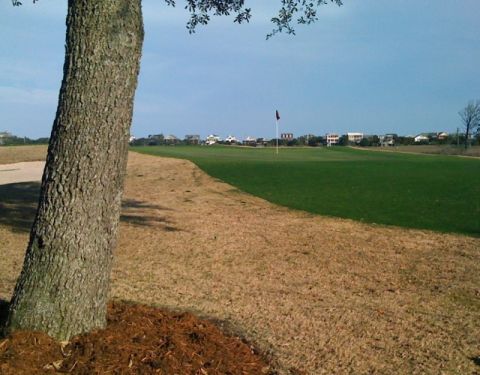I stopped at Martin’s Golf Superstore in Myrtle Beach one recent morning and the joint was jumping. I was fourth in line to pay for my two-dozen golf balls (my customary Bridgestone RX-Tours and a box of Titleist NXT-Tours that I wanted to try out, not that anyone cares); at a couple of other registers, the lines were equally long. As I paid for my purchase, the cashier shouted past me to the next cashier, “It never stops, does it?” “I take it you’ve been busy,” I offered. “Look,” he said, gesturing toward the huge store, “it isn’t like they have to shop here. Their lives don’t depend on it. But still they keep coming.” “So golf isn’t dead?” I asked. “Not here; not hardly,” he replied.
Maybe Myrtle Beach is an anomaly and all those buddy golfers up north have been chomping at the bit all winter to head south to tee it up. They probably booked the trips late last year, before they would learn that New England’s winter was to be the mildest on record. (Vermont National Golf Club, about an hour from the Canadian border, opened last week, about a month earlier than usual.) More likely, the traffic is the result of pent-up demand that is about six years in the making. People aren’t exactly feeling flush yet, but most folks I talk with are starting to consider spending some deferred discretionary dollars on themselves, on golf equipment, vacations, a big screen TV and, bless their hearts, on a vacation or retirement home in a golf community.

The parking lot has been full and the golf course at Pawleys Plantation jammed for the last few weeks, a sign that both the golf industry and golf developments may be in recovery mode.
The parking lot at Pawleys Plantation Golf Club south of Myrtle Beach has been filled most days for the last few weeks. I am a member of the club and called for a tee time three days in advance the week before daylight savings time. My only choices were 7:36 and 1:46; I’m not an early riser anymore and the 1:46 p.m. time would have meant miners’ helmets on the last couple of holes. Pawleys Plantation and golf clubs up and down the Grand Strand have been experiencing mostly full tee sheets for a few weeks, and on the South Carolina coast that can translate into something like the following scenario: Four golfing buddies stay in a 2 or 3 bedroom condo, have a great time, are curious about the market value of the place where they are staying and find out they could buy one like it for $100,000 or so. Then they go back north with ideas dancing in their heads. Pretty soon they convince their wives that a week near the South Carolina beach in the summer with the kids would be nice, they all have a great time, they look at a few vacation condos (in a golf community, of course), they consider how much more secure the job back home is looking lately as the economy picks up and, voila, they buy themselves a nice little vacation home.
Okay, that may be a bit fanciful, but not by much. Meanwhile, even more likely, many of the baby boomers who have deferred their move to their dream golf homes are starting to feel better about their IRAs and the potential to sell their primary homes, and they are thinking, “If not now, when?” I hear it from my Realtor contacts -- that they are busier than they have been since the beginning of the recession. I am finding it harder and harder to book a few minutes on the phone with my favorite Realtors. (One told me today he couldn’t talk because he had “a new agent in training, by my side 24x7.”) All indications are that the market for leisure residential properties, including in golf communities, is improving. Prices could start to trend up later this year.
The other day I played in a golf outing at Daniel Island. Rosemary and Mel Sole, who run the Ritson-Sole Golf School at Pawleys Plantation, were there too, and they told me that bookings for their golf academy are way up since January and running at a rate much better than any since before the recession. I can’t think of a better “leading indicator” for the game of golf and the reinvigoration of the golf housing market than a golf school. These are purely discretionary dollars people are spending on tuning up their games, and a signal that they intend to go out and play more, and maybe travel to play more, and perhaps even to purchase a home on a golf course.
If the golf schools and parking lots at the golf courses and golf superstores of Myrtle Beach are any indication, rumors of the death of golf have been greatly exaggerated. And if people are spending again on these barely necessities, can a serious uptick in sales of golf homes be far behind?
























